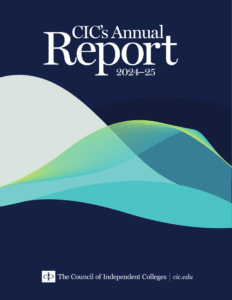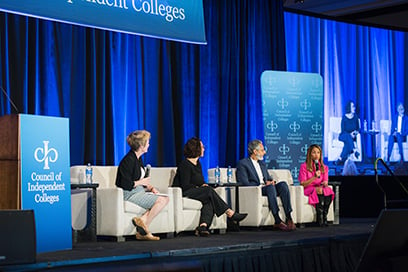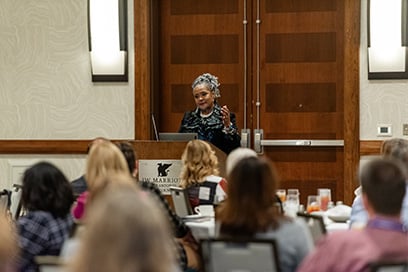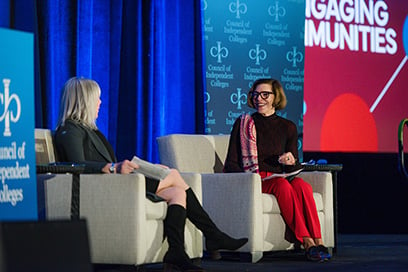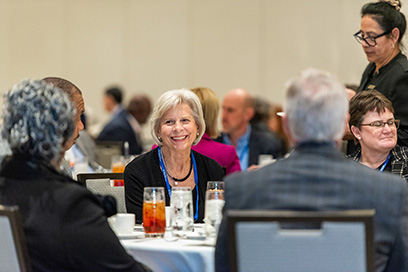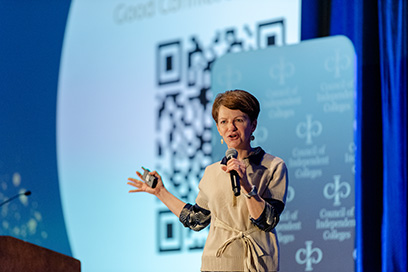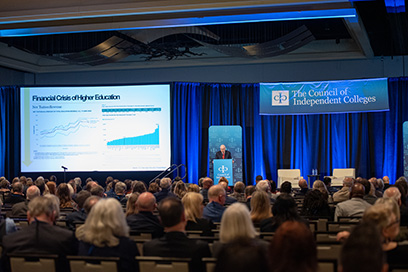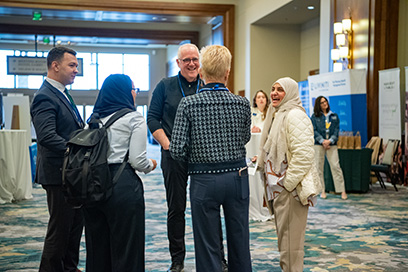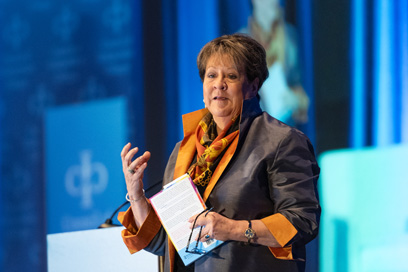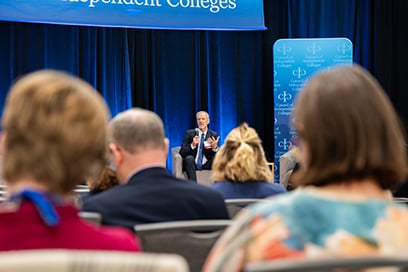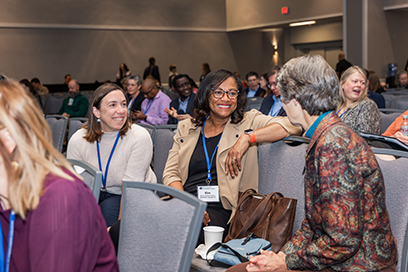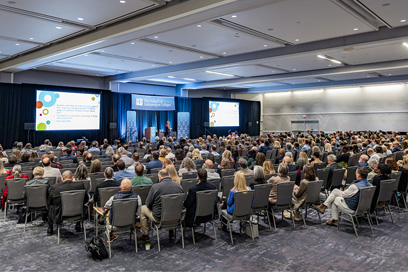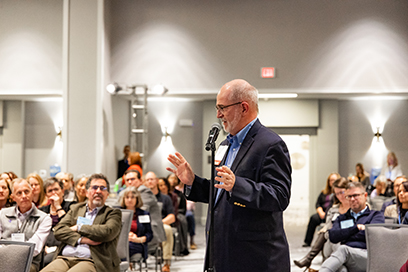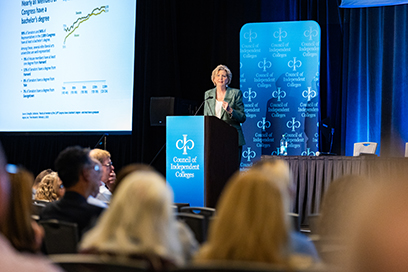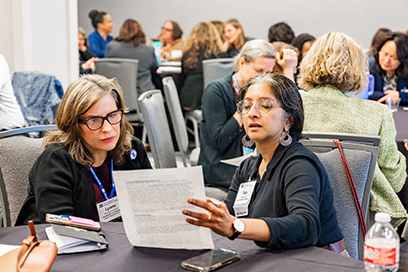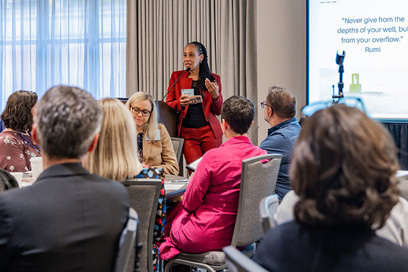During the past fiscal year, our member institutions have demonstrated resilience, innovation, and a steadfast dedication to the values that define independent higher education. The Annual Report details CIC’s efforts and initiatives to support this work, and highlights the impact of our programs on students, faculty, and the broader society.
We continue to offer a successful suite of CIC conferences, leadership development, publications, and other programs and services that help institutions improve educational quality, administrative and financial performance, student outcomes, and institutional visibility. CIC invites you to review the report, celebrate our shared successes, and reflect on the opportunities ahead.
In support of CIC’s three-tiered mission, CIC follows four strategic priorities:
- Ensure our institutes, leadership development programs, workshops, and conferences are ever more relevant, engaging, inspiring, and of practical use.
- Support member financial health and innovation.
- Increase member engagement.
- Strengthen CIC’s role as a visible champion of independent higher education.
“The Annual Report details CIC’s efforts and initiatives to support [our member institutions’] work, and highlights the impact of our programs on students, faculty, and the broader society.”
Marjorie Hass, President, CIC
CIC Networks

AI Ready
AI Ready is a 12-month network to foster learning, share resources, and increase effective adoption related to artificial intelligence (AI). The network focuses on both pedagogical and business uses for AI, bringing the current conversation about AI to key areas of campus. The network includes the following two programs:
- Program 1: All Campus Essentials (an opportunity to learn about and engage with nine pressing topics)
- Members in 2024–25 Cohort: 91
- Program 2: Build Your Own(a small, space-limited, pilot program for institutions ready to implement generative AI on campus)
- Members in 2024–25 Cohort: 20
Special Information: Year two of AI Ready will launch in August 2025 with Program 1: All Campus Essentials and Program 2: Building & Launching Together. As of June 2025, year two of AI Ready has received 44 applications for Program 1 and 14 applications for Program 2.
Belong: An Inclusive Learning Community
The Belong community is a network of CIC members dedicated to making their campuses more welcoming and inclusive. Belong’s suite of professional development resources for faculty and staff includes credentials by ACUE, all campus Cornerstone Webinars, Belong’s unique and popular “Push” resource library, and monthly community of practice meetings.
- Members as of June 2025: 66
- Credentials Issued to Belong Members: 764
- Faculty and Staff Webinar Registrants: 8,000
- Faculty and Staff Eligible for Belong’s Push Library: 10,000
Network for Vocation in Undergraduate Education (NetVUE)
The Network for Vocation in Undergraduate Education (NetVUE) is a nationwide network of more than 300 colleges and universities formed to support and enrich vocational exploration and discernment among undergraduate students. NetVUE is supported by the generosity of Lilly Endowment Inc. and member dues. Activities include a biennial national conference, regional gatherings and multi-campus collaborations, faculty seminars, campus visits and consulting services, online resources and networking, and the development of scholarly resources. In addition, a variety of grant opportunities are available to NetVUE member institutions to support professional development and vocation-related programming.
- Members as of June 2025: 344
- CIC Institutions: 305
- Non-CIC Institutions: 26
- Organizations: 13
Regional and Topical Gatherings
NetVUE campus teams gather regularly for professional development and sharing of best practices at regional and topical gatherings throughout the year.
- Theme: NetVUE “Big Read” Launch at Loras College: Vocation and the Common Good
- Date: September 12–14, 2024
- Location: Loras College (IA)
- Theme: Storytelling and Vocation at King University
- Date: October 23–25, 2024
- Location: King University (TN)
- Theme: Equity-Based Initiatives to Support Vocational Discernment at Texas Lutheran University
- Date: November 14–16, 2024
- Location: Texas Lutheran University
- Theme: Nonviolence and/as Vocation: An AAR/SBL Pre-Meeting
- Date: November 21–22, 2024
- Location: Preceding the AAR/SBL Annual Meeting (CA)
- Theme: Vocation and the Common Good: The Call of Belonging and Community
- Date: February 20–22, 2025
- Location: Furman University (SC)
- Theme: Vocation for All: Strategies for Programming and Assessment
- Date: April 3–5, 2025
- Location: Pacific Lutheran University (WA)
- Theme: Integrating Vocation in the Academic Disciples
- Date: May 29–31, 2025
- Location: Hope College (MI)
Professional Development Opportunities
- Consultants
- Current Year: 2
- Cumulative: 37
- Campus Visits
- Current Year: 1
- Cumulative: 23
- Faculty Development Seminar: Enhancing Vocational Exploration
- Date: June 2–6, 2025
- Location: Indianapolis, IN
- Participants: 10 (listed in the appendix)
- Faculty Development Seminar: Teaching Vocational Exploration
- Date: June 2–6 2025
- Location: Indianapolis, IN
- Participants: 16 (listed in the appendix)
- Faculty Fellows Seminar: Leading Vocational Exploration
- Date: June 10–13, 2025
- Location: Indianapolis, IN
- Participants: 14
- Focused Consultations
- Current Year: 3
- Cumulative: 12
- Staff Seminar: Vocation Across Campus
- Date: June 16–20, 2025
- Location: Memphis, TN
- Participants: 19 (listed in the appendix)
- Vocation Workshops
- Current Year: 10
- Cumulative: 15
- Reading Groups
- Current Year: 15
- Cumulative: 65
NetVUE Online Resources
CIC provides a wide range of online resources for NetVUE members, including a dedicated website, an online community site, a publicly accessible blog, a webinar series, and a social media presence.
- LinkedIn: NetVUE (Network for Vocation in Undergraduate Education) (1,089 followers as of June 2025)
- Blog: VocationMatters.org
- Podcast: “Callings: Conversations on College, Career, and a Life Well-Lived”
- Season 4 (2023–24): 11 episodes
- Season 5 (2024–25): 9 episodes published as of June 2025
- Periodic Webinars:
- “Using the NetVUE Conversation Cards” (February 2025)
- “The Vocation of Citizenship for the Common Good” (March 2025)
- Newsletter:
- January 23, 2025
- April 1, 2025
NetVUE Grant Programs
- Program Development Grants
- CIC awards grants to strengthen existing vocational exploration programs that are already supported by campus budgets. Member institutions may request between $30,000 and $60,000 for use over a two-year period to further develop or extend existing initiatives.
- Cumulative: $11,452,339 to 261 institutions
- Professional Development Awards
- CIC awards grants of up to $12,000 to enhance the knowledge, skills, and expertise of faculty and staff members who support undergraduate vocation-related initiatives at NetVUE member institutions. Up to $15,000 is available for projects with a special focus on diversity, equity, and inclusion.
- Cumulative: $2,156,027 to 244 institutions
- Vocation across the Academy
- This grant program is designed to strengthen the link between professional preparation and students’ exploration of meaning, purpose, and identity. Three-year grants support campuswide initiatives that emphasize this link as a continuum from the first year through the senior year, and/or across the range of academic disciplines and applied fields. The grant involves a partial donor match that can bring the total award to $90,000 in CIC and third-party funding, or $105,000 for projects that create partnerships with businesses, nonprofits, and community organizations.
- Cumulative: $3,509,547 to 87 institutions
- Grants for Reframing the Institutional Saga
- This program offers grants of up to $40,000 over two years to help institutions produce an updated account of their history and mission, with focused attention on the current state of the institution’s demographic profile, surrounding community, and founding organizations.
- Cumulative: $3,172,331 to 89 institutions
- Fostering Leadership for Communities of Faith
- The newest NetVUE grant program provides up to $40,000 over a two-year period to develop programming for students and/or professional development for faculty members and staff with the goal of connecting students to local faith communities and supporting these students as they explore and discern possible future leadership roles.
- Cumulative: $1,066,653 to 41 institutions
- Support for NetVUE Organizational Members
- These grants are designed to help organizational members of NetVUE deepen their capacities to strengthen the networks that they comprise, to broaden opportunities to promote vocational exploration and discernment among students at their member institutions, and to communicate the benefits of NetVUE membership to those institutions within their networks that are not yet members of NetVUE.
- Cumulative: $10,000 to 1 organization
CIC Online Course Sharing Consortium (CIC-OCSC)
CIC-OCSC allows participating colleges and universities to share courses, transfer credits and financial aid, and arrange for tuition payments through an online platform maintained by CIC’s partner Acadeum, with which CIC signed a new five-year agreement in 2024. The initiative helps students complete their degrees by enrolling in online courses offered by other consortium participants, avoiding the burden of transferring courses from outside institutions and filling excess capacity at partner institutions. In 2024, OCSC launched a credential marketplace for CIC members in the OCSC network.
- Members as of June 2025: 329
- Home Institutions: 314
- Teaching Institutions: 129
- Courses Available: 21,007
CIC Tuition Exchange Program (CIC-TEP)
CIC-TEP is a network of member colleges and universities that accept full-time employees of participating institutions and their family members as students, tuition-free. As of June 2024, CIC waived the annual fee for participation in CIC-TEP, and tens of thousands of employees and their families have been able to attend college tuition-free. An online portal facilitates the student application tracking and review processes. Nearly two-thirds of CIC member institutions participated in 2024–25 and that number is expected to increase in the future.
- Institutions Registered as of June 2025: 421
- Institutions Importing: 383
- Institutions Exporting: 355
- Students Applying: 1,893
- Applications Submitted: 4,203
- Awards Offered: 1,164
- Students Receiving at Least One Award: 901
State Council Member Programs and Services
CIC’s State Councils are consortia of private colleges and universities with the mission of advancing and strengthening their member institutions. Through its State Councils program, CIC provides member services and organizational development opportunities for these consortia, as well as grants and professional support for their activities in three specific program areas:
- Increasing recognition and enrollment of member institutions through collective public relations and branding initiatives that help “make the case” for private colleges and universities;
- Putting a college education within reach for deserving students of all income levels by raising private gifts and grants for scholarships;
- Expanding student internship and career opportunities, as well as developing corporate grant and sponsorship support, by connecting the private college sector to America’s business community.
Annual Conference
The State Councils Annual Conference is a convening of state council executives and their staff that offers a forum for face-to-face networking and an opportunity to share best practices with colleagues. Programming at the Annual Conference includes sessions dedicated to emerging trends and relevant topics providing tools for state executives colleagues to better serve their constituency of private colleges and universities.
- Date: April 13–15, 2025
- Location: Seattle, WA
- Attendance: 25 total participants; 14 State Councils organizations represented
- Sponsorship: $48,000 from five sponsors
State Council Scholarship Programs
- CIC/UPS Educational Endowment
- The CIC/UPS Educational Endowment provides grants to State Councils for innovative, collaborative projects within states and for programs that enhance access and success for students demonstrating financial need. Through these scholarship programs, the CIC/UPS Educational Endowment continues to impact the advancement of the independent college sector nationwide.
- Value: $52,619,299 (as of June 30, 2025)
- CIC/UPS Scholarships Program
- Each year, State Councils receive grants from CIC to provide CIC/UPS Scholarships for use at every four-year private college and university in the State Councils network. The scholarships are given in the name of UPS, whose financial support was the basis for the CIC/UPS Educational Endowment. Since 1985, approximately $62.2 million has been awarded in scholarship grants to assist students at independent colleges across the country demonstrating financial need.
- Fiscal Year 2025: $1,505,000 to 25 State Councils, $3,500 to 430 State Council member institutions
- Cumulative: Over $66,705,000 to 23,627 students
- Dorothea M. Waterbury Scholarship
- The scholarships are provided by an endowment, established by Dorothea Waterbury of Newton, MA, to fund scholarships for Pell-eligible students enrolled at selected CIC member New England colleges and universities.
- Fiscal Year 2025: $9,000
- Named Sponsorships
- Fiscal Year 2025: $23,500 to support six students
State Council Grant Programs
- Capacity-Building Grants
- The CIC Capacity-Building Grant Program was created to provide “seed money” grants for State Councils to enhance or expand their capacity to raise money to support their programs and member colleges. The grants are intended to provide funding for fundraising programs, particularly those targeted at attracting donors and financial support and/or organizational and staff development projects that strengthen the organization’s capacity to raise gifts and grants from corporations, foundations, and individuals.
- Fiscal Year 2025: $127,904 to 13 State Councils
- Cumulative: Approximately $789,749 across 88 projects
- Scholarship Challenge Grants
- Presidents of independent colleges and universities have made it clear that one of their highest priority needs is additional scholarship aid for deserving students. A second need is for scholarships that can improve student retention beyond the first year. CIC offers State Councils the opportunity to apply for challenge grants designed to leverage additional gifts for scholarships. To receive the CIC Scholarship grant, State Councils must raise the challenge grant amount from outside sources before the end of the fiscal year.
- Fiscal Year 2025: $160,000 to each of eight State Councils with an anticipated reach of 169 State Councils colleges and universities
- Cumulative: $3.87 million
- Meeting the Moment Grant
- The Meeting the Moment grant was created in 2025 to support State Council organizations in their efforts to assist member institutions as they navigate the evolving landscape of federal regulations and policies. This one-time grant provided funding to enhance resources, strategies, and programming that help independent colleges and universities remain informed and proactive in response to federal updates.
- Fiscal Year 2025: $146,250 to 16 State Councils
CIC Membership by the Numbers
(as of June 30, 2025)
Graphs and Data
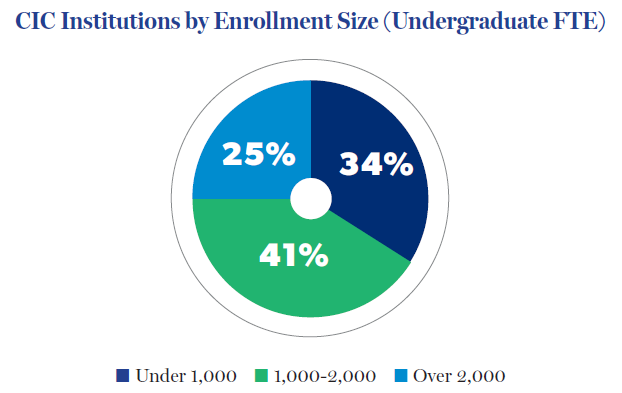
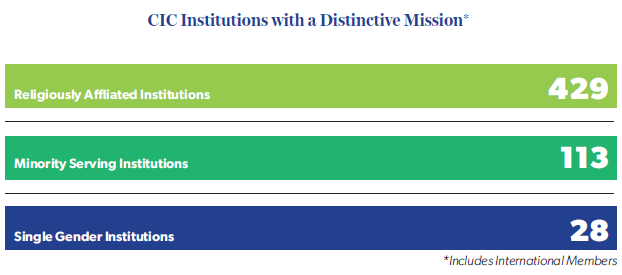
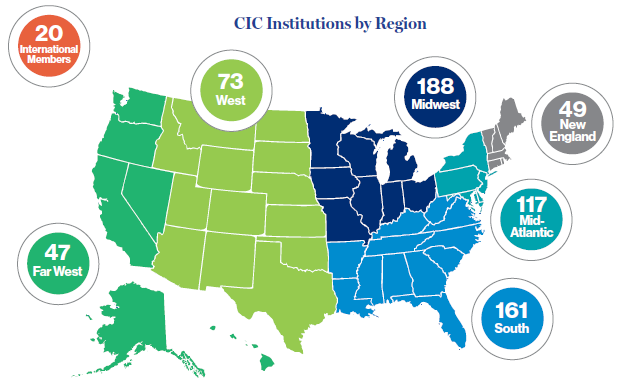
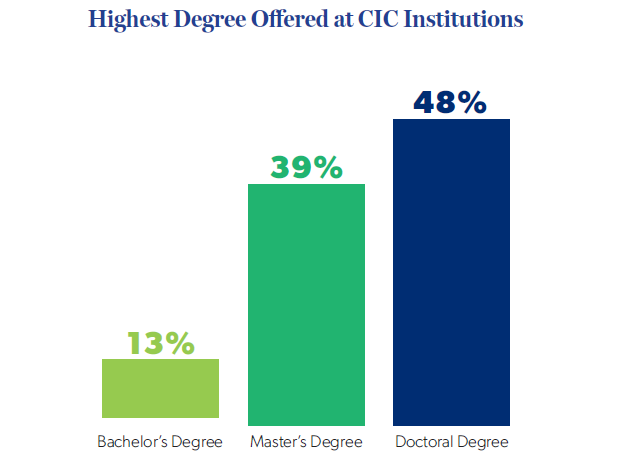
2025 Carnegie Institutional Classification of CIC Members
Thirty-one new Carnegie Institutional Classifications built on a new framework were released in Spring 2025. Institutional Classification is descriptive and consists of three dimensions: award level focus, academic program mix, and size.
| Mixed: Baccalaureate | 45 |
| Mixed: Undergraduate/Graduate-Master’s Small | 26 |
| Mixed: Undergraduate/Graduate-Doctorate Small | 20 |
| Mixed: Undergraduate/Graduate-Doctorate Medium | 16 |
| Professions-Focused: Baccalaureate Small | 113 |
| Professions-Focused: Undergraduate/Graduate-Master’s Small | 80 |
| Professions-Focused: Undergraduate/Graduate-Master’s Large/Medium | 24 |
| Professions-Focused: Undergraduate/Graduate-Doctorate Small | 49 |
| Professions-Focused: Undergraduate/Graduate-Doctorate Medium | 62 |
| Special Focus: Arts and Sciences | 123 |
| Special Focus: Nursing | 19 |
| Special Focus: Other Health Professions | 17 |
| Other Institutional Classification | 41 |
2025 Carnegie Student Access and Earnings “Opportunity” Classification
Student Access and Earnings Classification is evaluative and identifies the extent to which institutions provide access to students from lower socioeconomic and historically underrepresented racial/ethnic backgrounds and the degree to which their students earn competitive wages by geography. There are six classifications drawn from two levels of access and three levels of earnings.
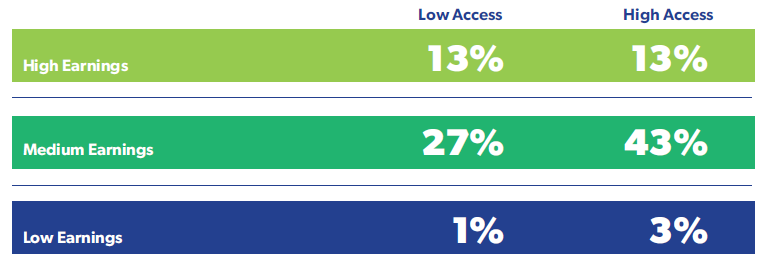
CIC Membership Survey
Every three years, CIC administers a survey to member presidents to better understand their needs and how CIC can best support them. In 2025, 13 percent of member institutions responded to the survey; they were representative of CIC’s overall membership. All responses indicated that CIC programs and services are valuable and responsive to current issues in independent higher education. In particular, respondents found professional development programs such as the Presidents Institute and the Institute for Chief Academic Officers, networks such as the Tuition Exchange Program and NetVUE, and research such as the KIT and FIT reports to be important.
In 2025, members noted the following issues to be top of mind:
- The financial model for higher education and financial health and sustainability
- The public perception of higher education
- Navigating federal policy and legislation
- Adapting to technological change
CIC Institute Highlights
Leaders from CIC member institutions and affiliate organizations gathered in January for the 2025 Presidents Institute in San Antonio, TX, and in November for the 2024 Institute for Chief Academic Officers and Their Teams in Portland, OR. Participants engaged in timely and practical discussions on the future of higher education and the essential role it plays in a time of great change.
Both Institutes provided an opportunity for participants to think creatively in community and return to their campuses with new inspiration, innovative solutions, and deeper professional relationships.
2025 Presidents Institute
The theme of the Presidents Institute was Engaging Communities, and participants explored ways colleges and universities can effectively engage communities and acquire tools to help reframe disruption and pursue new opportunities. Plenary panels offered direction and strategic advice on mitigating conflict, preserving cultures of free expression, and effectively navigating the federal policy agenda. Concurrent sessions and workshops provided insights and interaction from peers on subjects such as financial sustainability, legal challenges, belonging, data management and technology, graduate programming, and more.

2025 Institute Fast Facts
- Attendance: 269 presidents, 671 total participants from nearly 300 institutions from 45 states and 6 countries
- Sponsorship: $1,155,000 from 74 sponsors (new CIC record)
- Most Popular Sessions (Based on Attendance):
- Plenary Session: Breaking the Spell of High Conflict
- Plenary Session: Building Partnerships between Campus and Community
- Plenary Session: Campus, Community, and Free Expression
- Plenary Session: The Policy Agenda for Independent Higher Education
- Concurrent Session: Understanding the Election Results and the Economic Implications for Higher Education
- Case Study Session: Faculty and Staff High Conflict
- Information Session: Student Belonging in a New Era
- Women Presidents Meeting and Lunch
- Case Study Session: Alumni and Donors High Conflict
- Concurrent Session: AI Applications for Campus Administration
- Concurrent Session: Creating a Resilient Presidency
- Concurrent Session: Mergers and Partnerships Best Practices
- Concurrent Session: Data as Fuel for More Confident, Dynamic, and Distributed Leadership
- Concurrent Session: Building and Keeping Executive Teams
- Concurrent Session: Legal Issues that Keep Presidents Up at Night
2024 Institute for Chief Academic Officers and Their Teams
The theme of the Institute for Chief Academic Officers was Academic Leadership Now & Next, and chief academic officers and their teams collaborated on ways to build alliances, create innovative academic pathways, and unlock the potential of education for more students. Interactive seminars and concurrent sessions focused on artificial intelligence, bridging academic mission and the marketplace, prison education, and executive coaching to sustain energy and passion, in addition to other relevant themes and topics.

2024 Institute Fast Facts
- Attendance: 232 chief academic officers, 532 total participants from more than 200 institutions from 42 states and 4 countries
- Sponsorship: $315,000 from 31 sponsors (new CIC record)
- Most Popular Sessions (Based on Attendance):
- Plenary Session: AI and Academia: Leading the Charge in an Era of Educational (R)Evolution
- Plenary Session: Partnering for Good: Prison Education and the Potential for Transformation
- Problem-Solving Open Forum
- Information Session: Launch New Programs and Increase Access to In-Demand Courses and Certifications Through a Collaborative Network
- Gathering and Discussion Group for Women Administrators
- Interactive Seminar: Riding the AI Wave: Navigating Opportunities and Challenges in the Liberal Arts
- Concurrent Session: Innovation on a Shoestring
- Concurrent Session: Academic Reorganization: How Strategy Drives Structure
- Plenary Session: Telling Our Stories: The Impact of Independent Colleges/Universities
- Concurrent Session: Incentivizing, Acknowledging, and Rewarding Faculty Excellence
- Concurrent Session: Academic Leadership Through Transition
- Concurrent Session: Harnessing the Transformative Power of Artificial Intelligence Ethically and Effectively
- Concurrent Session: Navigating Difficult Conversations with Confidence and Care
- Interactive Seminar: Bridging Academic Mission with Market Demands
- Interactive Seminar: Sustaining Ourselves and Strengthening Our Organizations
CIC Development Program Highlights
Leadership Development Programs
- Presidential Vocation and Institutional Mission
- Presidential Renewal Program
- New Presidents Program
- Presidential Spouses and Partners Program
- Executive Leadership Academy
- Senior Leadership Academy
Faculty Development Programs
- Workshop for Department and Division Chairs
- Teaching Interfaith Understanding
- Teaching Pre-Modern European Art in Context
- Ancient Greece in the Modern College Classroom
- Funding the Future Workshops
- Improving Science Pedagogy Seminars and Activities
Institutional Development Programs
Research and Resources
CIC provides resources and materials about the sector to support members and their missions.
Key Indicators Tool (KIT) Benchmarking Report
The goal of the KIT Report is to provide benchmarking information to each member institution in areas such as student enrollment and progress, faculty composition and compensation, tuition revenue and financial aid, and institutional resources and expenditures relative to peers.
- Funding: RNL (through April 2025)
- Special Information: Reports are based on U.S. Department of Education Integrated Postsecondary Education Data System (IPEDS) data and prepared by the Austen Group. The 2025 KIT reports were distributed in April 2025. CIC has contracted with UQ Solutions to provide interactive and enhanced reports which will be available in Summer 2025.
Financial Indicators Tool (FIT) Benchmarking Report
The goal of the FIT Report is to provide benchmarking information to each member institution in areas such as resource sufficiency, debt management, asset performance, and operating results, along with an overall score for financial strength relative to peers.
- Funding: RNL (through April 2025)
- Special Information: Reports are based on IPEDS data and prepared by the Austen Group. The 2025 FIT reports were distributed in April 2025. CIC has contracted with UQ Solutions to provide interactive reports which will be available in Summer 2025. In 2026, UQ will validate and revise the FIT score and develop additional enhancements to the FIT report.
Both KIT and FIT are provided free of charge to Institutional Member presidents. RNL provides financial support for the KIT and FIT through an in-kind donation. The Austen Group, a unit of RNL, produces the reports with CIC. Consultations and custom benchmarking reports are available.
Additional Benchmarking Reports
In response to member needs and requests, CIC has developed two additional reports that are based on voluntary data submissions from members. These reports provide more timely and detailed data than is publicly available through IPEDS.
- KIT Part C: Data presented in this report allow institutions with graduate programs to see institutional data broken down between graduate and undergraduate programming. Standard KIT reports aggregate data across ALL students and the new Part C report disaggregates the program data.
- FIT Supplemental: This report allows institutions to provide their most recent IPEDS financial data for benchmarking against other participating institutions.
Digest of Recent Research
CIC publishes two issues of the Digest of Recent Research per year that highlight timely and pertinent research presidents and senior campus leaders might find helpful, releasing two issues per year.
- Funding Source and Amount: $90,000 from the Arthur Vining Davis Foundations
- Special Information: The most recent Digest was published in Spring 2025 and was edited by Bethany L. Miller, associate provost and chief data officer at Macalester College (MN), and Philip T. Dunwoody, social sciences division head and professor of psychology at Juniata College (PA). Under this new editorial oversight, each issue shares research and resources on a theme. The Spring 2025 theme is immigration policy, international enrollment and scholarship, and the impact on higher education. The final issue will be published in Autumn 2025 and will focus on impacts of federal policy. This is the final year of funding for the Digest of Recent Research, though readership has doubled under this new vision of CIC member editors and themed issues.
Solution Center
CIC introduced the Solution Center marketplace in January 2025, a dynamic platform built for the CIC community and designed to help independent colleges and universities find tailored solutions, services, and products on one platform. Managed by CIC, the marketplace connects institutions to companies and consultants dedicated to the independent higher education sector, free of charge. In Spring 2025, the sponsors of the Association of Catholic Colleges and Universities were added as suppliers to offer their services to CIC members. As of June 2025, there are more than 70 different categories to search and connect with more than 500 suppliers.
Graduate Program Study
Understanding the Landscape of Graduate Programs is a report that summarizes the findings of a 2024 survey of presidents and chief academic officers at CIC member institutions to better understand how independent colleges build, support, and sustain graduate programs and students. The report shares the context in which independent institutions are offering graduate programming and insights from their survey responses. A variety of factors has led to the growth of and demand for graduate programs. CIC intends to use the findings from this survey to assist institutions and university leaders in anticipating graduate market trends and building sustainable graduate programs that serve student needs and deliver transformative educational outcomes. Support for making this study available for free was provided by EducationDynamics.
The Resilient College: Preliminary Findings
CIC facilitated a research request from Todd Nicolet of the University of North Carolina and Michael Fern of Duke University (NC). Their research considers how small independent colleges are navigating current challenges. They interviewed 45 presidents and have issued a preliminary report, The Resilient College, focusing on the strategies that have potential. They listed enrollment, public perceptions, competition, and cost containment as main issues and suggested that administrative efficiencies, improved recruitment and retention efforts, rebranding, and alternative revenue generation contributed to greater institutional resiliency. The findings of their study are consistent with CIC’s findings from the triennial Membership Engagement Survey and annual president interviews.
Carnegie Classifications: Preliminary Report
In 2025, the American Council on Education (ACE) and Carnegie updated their work to produce three classifications: a descriptive “Institutional Classification,” an evaluative “Student Access and Earnings Classification,” and a “Research Classification.” This new vision of the Carnegie Classifications deemphasizes selectivity and research productivity and focuses on accessibility for students who are underrepresented in higher education and paths to degrees that will lead to high earnings for graduates. CIC has written a report to summarize the impact of these new categories on members. Among other findings, the report found that one-quarter of CIC members fall into the “Higher Earnings” category, while almost three-quarters of members fall into the “Medium Earnings” category.
Presidential Competencies Report
In September 2024, Academic Search released the 2024 Competencies for the College Presidency: A National Study of Effective Leadership in Higher Education in conjunction with the American Association of State Colleges and Universities and CIC. This survey of more than 700 college and university presidents identifies the leadership traits necessary to succeed in today’s challenging and political higher education landscape. Seven competencies for effective presidential leadership were identified in the study: trust building, demonstrating resilience, communication savvy, crafting a cabinet and building a team, emotional intelligence, leading with courage, and data acumen and resource management. The study’s researchers shared their insights during a session (“Creating a Resilient Presidency”) at the 2025 Presidents Institute and the 2025 Annual State Councils Conference.
Webinars
In response to CIC member data and requests for more information about ongoing topics of interest to the sector, CIC hosted several timely webinars.
- “Meeting the Moment: Navigating Federal Policy Changes” was held on February 26, 2025. This webinar was designed to show how one leadership team navigated the new policy environment resulting from numerous executive actions while staying true to their mission. The webinar also provided the CIC community an opportunity to share resources and advice for meeting the moment. Panelists included Susan Rundell Singer, president of St. Olaf College (MN); Eduardo Pazos Palma, vice president of community and belonging of St. Olaf; and Carl Crosby Lehmann, vice president and general counsel of St. Olaf. The discussion was moderated by CIC Vice President of Membership Engagement Jeff Woods.
- “Election Aftermath: Implications for Independent Higher Education” was held on December 10, 2024. This webinar featured robust and insightful discussions on anticipated legislative and policy changes that may impact enrollment, financial aid, and campus operations. The session featured Donna Carroll, president of the Association of Catholic Colleges and Universities; Marjorie Hass president of the Council of Independent Colleges; David Hoag, president of the Council for Christian Colleges and Universities; and Barbara Mistick, president of the National Association of Independent Colleges and Universities.
- “Inclusive Excellence as a Strategic Lens for Academic Leadership” was held on October 17, 2024. This was a follow-up to CIC’s June 2024 webinar, “No Secret to Being Fair.” The panelists discussed effective ways to combine strategic thinking and a commitment to inclusive excellence, with the goal of helping academic leaders maintain a focus on equity and inclusion despite resource constraints and external attacks on DEI. The webinar featured Linda Strong-Leek, provost of Haverford College (PA); LeeRay Costa, executive director of the Batten Leadership Institute at Hollins University (VA); and Bruce King, former chief diversity officer at St. Olaf College (MN) and Elmhurst University (IL).
- “Leadership Strategies for Campus Civil Discourse in an Uncivil Time” was held on September 24, 2024. The conversation focused on leadership strategies for fostering civil discourse on campus during the fall semester—despite potential mission, legal, and reputational challenges—and was moderated by Jacqueline Pfeffer Merrill, CIC Campus Free Expression Project director. The introductory session featured the Hon. Jim Douglas, former governor of Vermont and executive-in-residence of Middlebury College (VT) and co-chair of the Academic Leaders Task Force on Campus Free Expression; and the Hon. Chris Gregoire, former governor of Washington and CEO of Challenge Seattle and co-chair of the Academic Leaders Task Force on Campus Free Expression. The subsequent roundtable discussion featured Ronald A. Crutcher president emeritus of the University of Richmond (VA); John A. Nunes, interim president of California Lutheran University; and Stephanie Herseth Sandlin, president of Augustana University (SD).
- “CIC’s Virtual Gathering for New Presidents” was held on August 15, 2024. This online gathering served as an opportunity for new presidents of CIC member institutions to start building connections and discuss what is on their mind with peers. Kathy Humphrey, president of Carlow University (PA) and member of CIC’s New Presidents Program faculty, joined CIC President Marjorie Hass in facilitating this discussion.
Listservs
CIC provides 37 listservs and communities for various campus constituencies. All of the participants on the listservs are employees from CIC member institutions.
Campus Role Listservs
- Presidents Listserv
- CAO Listserv
- Advancement Listserv
- Chairs Listserv
- Chiefs of Staff Listserv
- Data Listserv
- Deans Listserv
- Enrollment Listserv
- Finance Listserv
- HR Listserv
- PR Listserv
- Presidential Assistant Listserv
- Presidential Spouse Listserv
- Student Affairs Listserv
Network Listservs
- Belong Community Listserv
- NetVUE Listserv
- State Councils Listserv
- Tuition Exchange Program Listserv
Legacies of American Slavery Website
In 2022, CIC introduced a dedicated website and blog as part of its ongoing initiative, Legacies of American Slavery: Reckoning with the Past. The site includes curated links, updates from the network of participating colleges and universities, and other resources to help institutions and individuals explore, teach, and address the multiple legacies of slavery in American life. The site also includes recorded sessions from a conference that CIC hosted in Memphis, TN, in September 2024.
Independent Newsletter
CIC’s Independent newsletter, published since 1956, includes information on CIC’s recent and upcoming programs and services as well as a column on higher education issues, news briefs on higher education research, and news highlights from member institutions. The newsletter is published twice a year. View all issues.
Social Media
- Twitter/X: @CICnotes (2,420 followers as of June 2025)
- LinkedIn: Council of Independent Colleges (7,607 followers as of June 2025)
- LinkedIn Group: “Council of Independent Colleges – Members” (78 members as of June 2025)
- Threads: cic_independent_colleges (32 followers as of June 2025)
- Bluesky: @cicnotes.bsky.social (159 followers as of June 2025)
Letters to Government Officials and Amicus Briefs
- Letters: 6
- Briefs: 2
